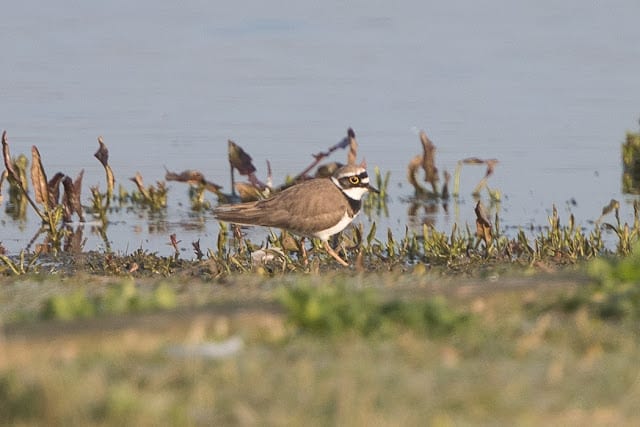This first half of April has been fantastic, like mid-summer come early, after an early morning breeding bird survey where the highlights were a couple of Song Thrush and a Willow Warbler I spent a couple of hours at Pennington Marsh. Spring really is here and there wereBlackcap singing from the scrub, fair numbers of Chiffchaff and at least six Willow Warbler.
On Efford Lagoon the Little Ringed Plover have returned and one bird gave good views on the near shore as it ran amongst the Black-headed Gull – now in their spring finery. I walked out past Shoveler Pools but it was fairly slow going. A while scanning out to sea produced none of the hoped for returning tern but around 150 Dunlin, 30 Grey Plover and six Knot kept me interested.
The Bearded Reedling were still frantically nest building on Butts Lagoon and there were at least four male and two female present. On Fishtail Lagoon there were two Spotted Redshank, still in their winter plumage, three Ruff and a fine, but skulky, summer plumaged Water Pipit.
Little Ringed Plover- Pennington Marshes
Black-headed Gull and Little Ringed Plover- Pennington Marshes
I wandered out to Keyhaven Lagoon but there was little to be seen, 15 Shelduck and a single Greenshank while in the scrub a Dartford Warbler sang and a Willow Warbler showed fairly well.
Dartford Warbler – Pennington Marshes
Willow Warbler – Pennington Marshes
Willow Warbler – Pennington Marshes
It was time to head back to the car, the gorse is just starting to flower in full fervour and the heady coconut aroma filled the air.Chaffinch and Linnet were singing from the golden fronds of the gorse while Cetti’s Warbler gave onlybrief glimpses as at least four birds chased one another in territorial dispute.
A single Swallow flew rapidly north but it was the only hirundine of the morning. As I wandered back to the car a pair of Mediterranean Gull flew over calling, always fantastic birds but particularly stunning against the deep blue sky.
A final look at Efford Lagoon produced a pair of Great-crested Grebe in display, they swam to the shore side and it was evident tha,t as the female flattened her body, they were about to copulate but unfortunately the local Coot disturbed them but they went back to displaying fairly close to the shore but unfortunately a little distant for the camera.
Chaffinch – Pennington Marshes
Linnet – Pennington Marshes
Chaffinch – Pennington Marshes
Mediterranean Gull – Pennington Marshes
Great-crested Grebe, this display seemed to be the female encouraging the male to copulate – Pennington Marshes
Great-crested Grebe, the male was a bit sheepish when the female adopted this obvious ‘come-on’ pose – Pennington Marshes
Great-crested Grebe, the pair went back to this head shaking display before heading back into the centre of the lake – Pennington Marshes
Great-crested Grebe – Pennington Marsh
Great-crested Grebe – Pennington Marsh
Wren – Pennington Marsh
After grabbing some lunch and a coffee at Waitrose I headed to Denny Wood for a short wander and to see if the Redstart were back. There were at least four Redstart on territory but all were very elusive at the tops of the trees.
It was time to head into the office but it had been a lovely morning out birding.
Treecreeper – Denny Wood
Simon Colenutt
I began birdwatching at the age of nine when living on the Isle of Wight. After obtaining a copy of the Isle of Wight Bird Report from 1976 I realised that Manx Shearwater, Arctic Skua, Pomarine Skua and Black Tern were regularly seen at St.Catherine's Point, only five miles from my home village of Chale Green. To a nine year old these birds were near mythical and so I just had to go and try to see them. Little did I know that these birds were seasonal and after a long winter of seeing nothing I eventually started to bump into other birdwatchers as March drew to a close. It was then that Dave Hunnybun, Dave Wooldridge, Paul Castle, Peter Gandy and Audrey Wilkinson introduced me to the art of seawatching and the joys of bird migration, I have not looked back since.

















Leave a Reply